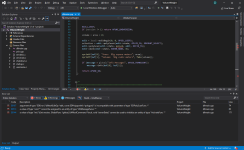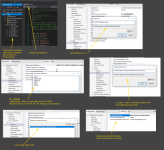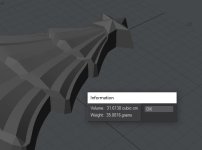kyuzo
New member
Hi All,
I'm taking beginner steps in coding, and am trying to make a simple modification to this plugin for my work.
I am using the x64 version of the AreaVol plugin which (according to the text file bundled with it) was: "Updated for LightWave 9.x and compiled for x64 by Michael Wolf, http://www.db-w.com", which was available here: https://forums.newtek.com/showthread.php/93321-Measure-volume-plugin-for-x64
It included the source code.
I am using Visial Studio 2019, and have set it up to use _X86_, _MSWIN; the path to Lightwaves SDK 'include' folder; and the source files. I'm reasonably confident that I haven't missed anything out from the setup detailed in the SDK, but when I load in the source code, I am getting three errors. I don't know enough about coding plugins yet to work out what exactly they mean, but I expected that by using the source code of the actual working plugin, and (hopefully) following the setup instructions of the SDK, that the plugin would load 'as-is' without any errors.
The changes I intend to make are incredibly simple, (basically include a multiplier to change the result from cubic metres to cubic centimetres, and another to change the volume to a weight in grams using a known density of the material we work with) but so far I haven't made any changes yet. I just wanted to go through the process of compiling it to understand the process.
If anyone can take a look at the errors listed on the screen shot and give me a nudge (or shove) in the right direction, I'd much appreciate it.
Have I missed a source file? Has an update to Lightwave broken this? (Unlikely as the plugin itself still works..?)
Cheers,
Derek
View attachment 149072
I'm taking beginner steps in coding, and am trying to make a simple modification to this plugin for my work.
I am using the x64 version of the AreaVol plugin which (according to the text file bundled with it) was: "Updated for LightWave 9.x and compiled for x64 by Michael Wolf, http://www.db-w.com", which was available here: https://forums.newtek.com/showthread.php/93321-Measure-volume-plugin-for-x64
It included the source code.
I am using Visial Studio 2019, and have set it up to use _X86_, _MSWIN; the path to Lightwaves SDK 'include' folder; and the source files. I'm reasonably confident that I haven't missed anything out from the setup detailed in the SDK, but when I load in the source code, I am getting three errors. I don't know enough about coding plugins yet to work out what exactly they mean, but I expected that by using the source code of the actual working plugin, and (hopefully) following the setup instructions of the SDK, that the plugin would load 'as-is' without any errors.
The changes I intend to make are incredibly simple, (basically include a multiplier to change the result from cubic metres to cubic centimetres, and another to change the volume to a weight in grams using a known density of the material we work with) but so far I haven't made any changes yet. I just wanted to go through the process of compiling it to understand the process.
If anyone can take a look at the errors listed on the screen shot and give me a nudge (or shove) in the right direction, I'd much appreciate it.
Have I missed a source file? Has an update to Lightwave broken this? (Unlikely as the plugin itself still works..?)
Cheers,
Derek
View attachment 149072



